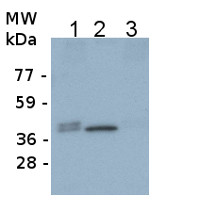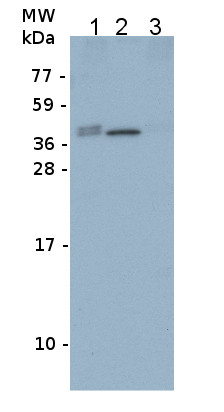1

Anti-FBA | Fructose-bisphosphate aldolase 1 (chloroplastic)
- Product Info
-
Immunogen: KLH-conjugated peptide chosen from chloroplast fructose-1,6-bisphosphate aldolase (FBA) EC 4.1.2.13 chosen from Brachypodium distachyon FBA protein sequence. UniProt: I1IN47
Host: Rabbit Clonality: Polyclonal Purity: Serum Format: Lyophilized Quantity: 50 µl Reconstitution: For reconstitution add 50 µl of sterile water Storage: Store lyophilized/reconstituted at -20°C; once reconstituted make aliquots to avoid repeated freeze-thaw cycles. Please remember to spin the tubes briefly prior to opening them to avoid any losses that might occur from material adhering to the cap or sides of the tube. Tested applications: Western blot (WB) Recommended dilution: 1 :4000-1 : 8000 (WB) Expected | apparent MW: 42 | 38 kDa - Reactivity
-
Confirmed reactivity: Arabidopsis thaliana, Chrysanthemum seticuspe (Gojo-0), Festuca arundinacea, Lolium multiflorum, Oryza sativa
Predicted reactivity: Aegilops tauschii, Arundo donax, Avena sativa, Brachypodium distachyon, Cajanus cajan, Catharanthus roseus, Carica papaya , Citrus sinensis, Cucumis sativus, Eucalyptus grandis, Genlisea aurea, Glycine soja , Gossypium raimondii, Hordeum vulgare var. distichum, Jatropha curcas, Leersia perrieri, Manihot esculenta, Medicago truncatula, Nicotiana tabacum, Phaseolus vulgaris, Populus trichocarpa, Ricinus communis, Setaria italica, Solanum lycopersicum, Solanum tuberosum, Sorghum bicolor, Trifolium pRatense, Triticum aestivum, Zea mays, Vitis vinifera
Species of your interest not listed? Contact usNot reactive in: No confirmed exceptions from predicted reactivity are currently known - Application Examples
-
Application example 
Arabidopsis thaliana Col-0 chloroplast fraction (1), stroma (2), membrane fraction (3). Chloroplasts were isolated by grinding 60g of Arabidopsis thaliana leaves in extraction buffer (50mM Hepes-KOH pH7.3, Sorbitol 330mM, 2mM EDTA, 0.1% BSA, 1mM DTT, 5mM Ascorbate). After centrifugation at 2000g, 4°C, 5 minutes, crude chloroplasts were resuspended in extraction buffer and
layered on a 40%-80% percoll gradient and centrifuged at 7000g, 4°C, 20 minutes. The intact chloroplasts were kept, washed in 5 volumes of extraction buffer and centrifuged 2000g, 4°C, 5 min. Lysis buffer was
added (Hepes-KOH pH8 30mM, MgOAc 10mM, KOAc 60mM, DTT 1mM and protease
inhibitor) and an aliquot of total chloroplasts was kept. The stromal fraction was isolated by centrifugating sample at 18000g, 30min, whereas the pellet was the membrane fraction to which lysis buffer was added. NP40 was added to each fraction to 1% and proteins were quantified with bradford assay. Fraactions were mixed with 3X SDS-PAGE buffer (150mM Tris pH6.8, 150mM NaCl, 100 mM DTT, 20% glycerol, 3%SDS) and denatured at 95°C for 10 min. 10 ug of proteins were separated on 12% SDS-PAGE and blotted overnight to PVDF using tank transfer. Blots were blocked with
5% milk in TBS-T 0.05% for 1h at room temperature (RT) with agitation.
Blot was incubated in the primary antibody at a dilution of 1: 5 000 for 1h at RT with agitation in TBS-T. The antibody solution was decanted and the blot was rinsed briefly twice, then washed 3 times for 5 min in TBS-T at RT with agitation. Blot was incubated in secondary antibody (anti-rabbit IgG horse radish peroxidase conjugated, AS09 602 from Agrisera) diluted to 1:10 000 for 1h at RT with agitation. The blot was washed as
above and developed for 1min with GE Healthcare detection reagents.
Exposure time was 10 seconds to 1 minute.
Courtesy of Dr. Louis-Valentin meteignier, CNRS, France - Additional Information
-
Additional information: This product can be sold containing ProClin if requested.
Additional information (application): Standard extraction protocol for leaf tissue can be applied. The antibody is directed on the unique peptide present in a chloroplast form of aldolase; it does not react with a cytosolic form in the Lolium-Festuca species. - Background
-
Background: FBA (Fructose-bisphosphate aldolase, chloroplastic) is an enzyme involved in step 4 of the subpathway that synthesizes D-glyceraldehyde 3-phosphate and glycerone phosphate from D-glucose.
- Product Citations
-
Selected references: Fukayama et al. (2018). Expression level of Rubisco activase negatively correlates with Rubisco content in transgenic rice. Photosynth Res. 2018 May 30. doi: 10.1007/s11120-018-0525-9.
Perlikowski et al. (2016). Water deficit affects primary metabolism differently in two Lolium multiflorum/Festuca arundinacea introgression forms with a distinct capacity for photosynthesis and membrane regeneration. Frontiers in Plant Science 7:1063. doi: 10.3389/fpls.2016.01063
- Protocols
-
Agrisera Western Blot protocol and video tutorials
Protocols to work with plant and algal protein extracts - Reviews:
-
This product doesn't have any reviews.


